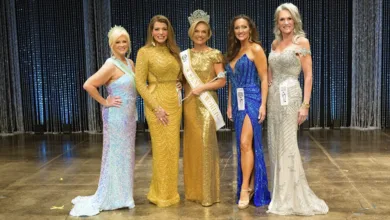Are Grandparents the Answer to America’s Childcare Crisis?
Exploring the rising role of grandparents amid soaring childcare costs

Vice President JD Vance ruffled more than a few feathers when he claimed the country was being run by “childless cat ladies,” supposedly referring to when Democrats were in power.
In an attempt at damage control, his wife clarified that he meant parenting in America is difficult—and that skyrocketing childcare costs make it even harder.
While Vance may have backtracked on his words, he wasn’t wrong about one thing: the cost of childcare in America is out of control. According to the Department of Labor, families spend between 8.9% and 16.0% of their median income on full-day care for just one child.
In response, he floated one eyebrow-raising idea: that Grandma and Grandpa could step in—for free—to ease the burden on daycare systems. But is that really feasible?
Fact: The average household can’t afford quality daycare.
Fact: It still takes a village to raise a child.
Undefined: Grandparents may make wonderful caregivers—but is it realistic to expect them to take on full-time care?
As a grandparent, you want the best for your grandkids. However, transitioning from being fun Gran and Pa to daily childcare providers is a significant mental and emotional adjustment.
Are grandparents the answer to America’s childcare crisis? Let’s explore that question.
Emotional support advocates
Involved grandparents often take on supportive roles long before a baby arrives —from celebrating pregnancy announcements to shopping for tiny clothes, the excitement is contagious.
But not all births go according to plan. According to the CDC, about one in every ten infants born in the U.S. is preterm. When a baby ends up in the NICU, parents face an overwhelming emotional toll—grappling with helplessness, fear, and the heartache of being unable to hold or comfort their newborn freely.
No mother—or father—is prepared for the challenges when a baby is confined to the NICU. Parents have no control and must entrust their fragile newborn’s survival to healthcare providers, often filled with anxiety and confusion.
Many low-birthweight infants are fed cow’s milk-based formulas to replace human breast milk. But what happens when a baby has an adverse reaction to the prescribed preterm infant formula? What if they’re fed too much or too little?
The latest NEC lawsuit updates paint a grim picture for parents affected by the NEC baby formula lawsuits. Research from the National Library of Medicine linked Similac and Enfamil to necrotizing enterocolitis (NEC), a potentially fatal gastrointestinal disease in premature babies.
Parents have filed lawsuits against formula manufacturers, alleging they failed to warn consumers of these risks. Hundreds of cases have been consolidated into multidistrict litigation (MDL), with even more lawsuits being filed separately. [Source: TorHoerman Law | National Library of Medicine]
Parents need emotional support despite the legal implications of the NEC lawsuits involving baby formula. Riddled with anxiety and confusion, caring for a preterm baby with comorbidities takes a heavy toll. As a grandparent, you don’t need to solve everything. All you have to do is show up, listen, and hold space for your kids as they navigate an unimaginably difficult time.

Practical support in a changing world
A lot has changed since you were changing diapers yourself. Today’s grandparents may consider brushing up on modern childcare recommendations — or even enrolling in a refresher course.
What to Expect, a trusted pregnancy and parenting online website, suggests reacquainting yourself with parenting advice that has evolved over the years.
Consider these important areas of care:
Safe sleep
What constitutes safe sleep for babies has changed dramatically over the past decades.
Today, experts recommend placing babies on their backs to sleep and avoiding loose bedding, bumpers, or pillows. Several studies have linked stomach sleeping —once commonly encouraged—to a higher risk of sudden infant death syndrome (SIDS).
Feeding myths: bulking up baby’s feeds
Baby Boomers are fans of the rice cereal in the bottle method, believing it fills the baby up and helps them sleep. However, there’s no scientific evidence supporting this.
According to WebMD, adding rice cereal to an infant’s feed does more harm than good by raising the risk of choking.
Spoiling a baby: a myth
No, picking up a crying baby does not spoil them. Contrary to popular belief, comforting a distressed baby is not a sign of manipulation or spoiling. In the first few months, babies have not yet learned to self-soothe, and crying remains their primary means of communication.
Today’s grandparents play a powerful role — but it requires adapting to everything we now know about infant development, safety, and emotional bonding.
Nothing comes for free
Should grandparents be paid to babysit their grandkids? It’s a polarizing question that sparks plenty of debate.
Traditionally, offering grandparents financial compensation for caregiving has been considered taboo in the U.S. However, today’s economic realities are different. Many families cannot afford to assume that anyone — even loving grandparents — can provide full-time care for free.
Leaving a paid job, delaying retirement savings, or sacrificing personal time comes at a real cost.
In Sweden, the government acknowledges the value of intergenerational caregiving by offering paid leave programs for grandparents who help care for their grandchildren during the critical first year.
The U.S. could benefit by adopting a similar approach, offering three months of paid grandparent leave to help bridge the childcare gap.
Everyone benefits when families are supported—and when grandparents are empowered to help without sacrificing their own financial or emotional well-being.





